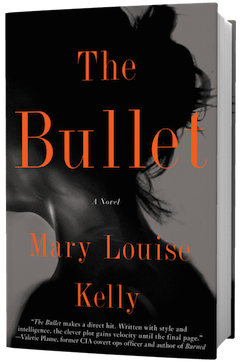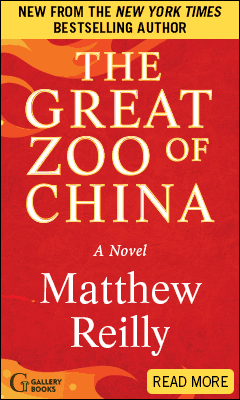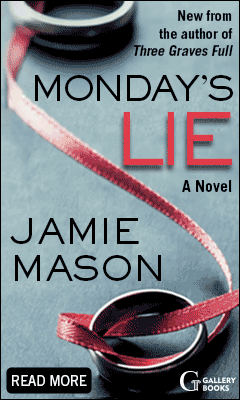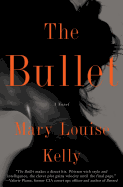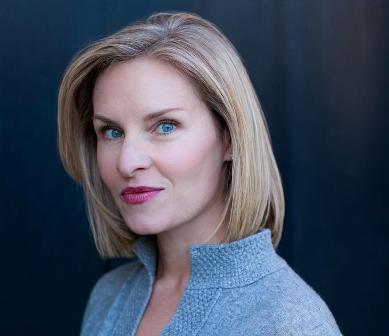The Bullet
by Mary Louise Kelly
Mary Louise Kelly's second novel, The Bullet, doesn't take long to build up to the suspense: fewer than 10 pages in, Kelly's protagonist, Caroline Cashion, goes for an MRI to assess what could be causing a persistent pain in her wrist, and is startled when the technician asks her how she came to have a bullet in her neck. Though Caroline chalks it up to a mistake, further x-rays reveal that, yes, she really does have a bullet in her neck--and absolutely no memory of how it got there. She naturally turns to her parents, with whom she is very close, for an explanation, and is startled to learn that she is adopted, that her biological parents were murdered, and that the bullet in her neck is in fact the same bullet that killed her mother.
This knowledge is a dividing point in Caroline's life: before the bullet, she was a play-by-the-rules professor of French literature at Georgetown who had weekly dinners with her parents. After the bullet, she realizes she is no longer certain who she is. "You think you know someone," she says. "And then, at thirty-seven, you grow up."
At the very beginning of the novel, Caroline promises readers "a story about fear." The Bullet is that: the story of a woman with more to be afraid of than she ever could have imagined. But it is the way this fear pushes Caroline to "grow up," as she puts it, that comprises the most interesting parts of Kelly's well-plotted novel. Armed with scraps of knowledge about her parents' deaths and the fact that she is walking around with evidence in her neck--evidence some murderer could potentially want to prevent from falling into the hands of the police--she is willing to do everything possible to find out what happened to her parents all those years ago.
She takes a leave of absence from her teaching position and flies to Atlanta to visit the house she once lived in--the house her parents died in. She meets her once-neighbors, digs around in the archives of the local paper and talks to the detective who worked on her parents' case. When nothing gets her the information she wants, though, she takes matters into her own hands, pushing Kelly's story toward a conclusion that is at once shocking and yet entirely believable.
Perhaps even more fascinating than the story of the bullet itself, though, is seeing how Caroline interacts with those around her. Kelly's secondary characters are as well defined and multi-layered as her protagonist: the aging, slightly inappropriate journalist at the Atlanta Journal-Constitution and the young, hip newspaper archivist at the same office; the doctor who listens to country music and drives a red Jeep and just might have a thing for Caroline; the Southern belle next-door neighbor who tells Caroline stories about her biological parents; the two loving and protective older brothers who are as supportive of Caroline as they are hard on her.
And as Caroline grows into her knowledge of her past, her relationships with each of these individuals--and others--shifts and changes and grows as well. Kelly deftly explores how Caroline's relationship with her adoptive parents, always close, adjusts to their newly shared knowledge. Caroline's brothers step up to support Caroline in her most desperate moments in ways that only siblings can, whether it be covering for her to their parents or sharing much-needed shots of rye at the local bar. Caroline herself starts pushing back in new ways on some of the forces working against her in Atlanta.
The Bullet marks a different tack for Kelly, whose debut novel, Anonymous Sources, was a political thriller complete with terrorist threats and international spies. But the lack of political intrigue in The Bullet does not mean it lacks suspense; instead, its slow psychological build is riveting, and The Bullet is relentless in its twists and turns.
All of this is brought to life in language grounded in fact and reality, clearly drawn from Kelly's experience as a journalist (she spent two decades working as an international news correspondent for NPR and the BBC). The places Caroline visits shine with enough detail to make them feel real--Kelly visited each locale featured in The Bullet while working on the manuscript—but never so much as to feel cumbersome. The dialogue serves to move the story forward without feeling forced or unnatural. And the psychological exploration of what resources we can find within us in moments of extreme stress feels so authentic as to leave us wondering what we ourselves might have within us, if we were ever pushed to reach for it. --Kerry McHugh



